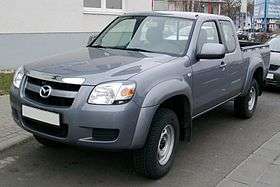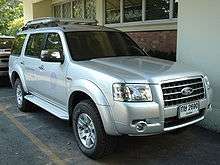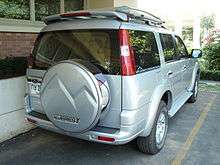Mazda BT-50
| Mazda BT-50 | |
|---|---|
_XTR_4WD_4-door_utility_(2015-07-24)_01.jpg) | |
| Overview | |
| Manufacturer | Mazda |
| Production | 2006–present |
| Body and chassis | |
| Class |
Compact pickup truck (2006–2011) Mid-sized pickup truck (2011–present) |
| Related |
Ford Ranger JMC Yuhu |
| Chronology | |
| Predecessor | Mazda B-Series |
The Mazda BT-50 (model code J97M) is a compact/mid-sized pickup truck produced by the Japanese manufacturer Mazda since 2006. It is a larger version of the predecessor B-Series pickup and is not sold in the Japanese and North American markets. Until 2011, Ford had also sold a version of the first-generation BT-50 as the Ford Ranger and as the SUV Ford Everest. From 2011 the second-generation Ranger has been designed by Ford Australia, with a Mazda derivative sold as the BT-50.
First generation (J97M; 2006–2011)
| First generation | |
|---|---|
 | |
| Overview | |
| Production | 2006–2011[1][2] |
| Assembly |
Mazda BT-50: Rayong, Thailand (AAT)[3] Bogota, Colombia (CCA) Willowvale, Zimbabwe (WMMI) Silverton, South Africa (Ford Motor Company) Ford Ranger: Hai Duong, Vietnam (Ford Vietnam) Bogota, Colombia (CCA) Rayong, Thailand (AAT) Chongqing, China Nanjing, China |
| Body and chassis | |
| Class | Compact pickup truck |
| Body style |
2-door single cab 2-door extended cab 4-door double cab 5-door wagon (Ford Everest) |
| Layout | Front-engine, rear-wheel drive or four-wheel drive |
| Related | Ford Ranger |
| Powertrain | |
| Engine |
2.5 L I4 (diesel) 3.0 L I4 (diesel) |
| Transmission |
5-speed manual 5-speed automatic |
| Dimensions | |
| Wheelbase | 3,000 mm (118.1 in) (double cab) |
| Length | 5,170 mm (203.5 in) (double cab) |
| Width | 1,804 mm (71.0 in) (double cab) |
| Height | 1,762 mm (69.4 in) (double cab) |
| Curb weight | 1,763–1,878 kg (3,887–4,140 lb) |
The BT-50 was launched at the Bangkok Motor Show on 22 March, 2006. It shares its Duratorq/MZR-CD 2.5- and 3.0-liter diesel inline-four engines with the Ranger. In late November, 2006, the new five-speed automatic transmission with Borg Warner transfer case has been added, as well as side airbags.
The BT-50 received a minor redesign in the first quarter of 2008, with a revised interior and several optional items made standard.
The model sold in Mexico and Central and South America includes these options:
- A 2.6-liter straight-4 4x4 only, same engine and transmission used in the previous Mazda B2600
- A 2.2-liter straight-4 4x2 only, entry-level model same as the old B2200
- A 2.5-liter diesel straight-4 either 4x2 or 4x4
Ford Everest


Ford also offers an SUV version of the Ranger, known as the Ford Everest in Asia, Central America, and the Bahamas, and since late 2009 as a 2010 model, in South Africa, where it replaces the Australian-sourced Ford Territory. In India, it is called the Ford Endeavour.
The second-generation Everest has three rows of seating, and rear- or four-wheel drive. It offers Duratorq diesel engines and two different drivetrains: 4x2 for 2.5-liter 143 hp (107 kW) models, and 4x4 for 3.0-liter 156 hp (116 kW) models. In addition, the redesign featured the new five-speed automatic transmission with a Borg Warner transfer case, and the new Active-Shift-on-the-Fly (4x4 only) for the first time.
In the United States, Ford had planned to name an extended-length version of the Ford Expedition the Everest in 2006 as a replacement for the Ford Excursion, but changed at the last minute and decided to rename it the Expedition EL.[4]
In mid-2009, the Everest received a facelift in Southeast Asia, in line with the Ranger's recent update. This facelifted 2009 edition of the Ford Everest continues to be available with either a 2.5-liter turbodiesel with 143 PS (105 kW; 141 hp) or a 3.0-liter turbodiesel with 156 PS (115 kW; 154 hp).
Also, a model for east Africa has a 2.5-liter turbodiesel with only 107 PS (79 kW; 106 hp), torque 268/2000. In Singapore, the Everest is used by Singapore Guards as a Protected Light Utility Vehicle.
A third facelifted model of the Everest was unveiled at the Manila International Auto Show in April 2013. On 29 April 2014, the third facelift Ford Endeavour was launched in India. This Endeavour features a touch-sensitive SATNAV entertainment system with Navigation Bluetooth audio control and reverse parking camera. Its manual variant comes with a 2.5-liter Duratorq TDCi paired to a five-speed manual transmission.
| Model | Years | Engine type/code | Power, torque@rpm |
|---|---|---|---|
| Diesel engines | |||
| 2.5 MZR-CD | 2006– | 2,499 cc (2.499 L; 152.5 cu in) I4 Duratorq TDCi | 143 PS (105 kW; 141 hp)@3500, 330 N⋅m (240 lb⋅ft)@1800 |
| 3.0 MZR-CD | 2006– | 2,953 cc (2.953 L; 180.2 cu in) I4 Duratorq TDCi | 156 PS (115 kW; 154 hp)@3200, 380 N⋅m (280 lb⋅ft)@1800 |
| Model | Selections | ||
|---|---|---|---|
| Diesel engines | |||
| 2.5 MZR-CD | 5-speed manual | ||
| 3.0 MZR-CD | 5-speed manual, 5-speed automatic | ||
| Model | Years | Acceleration (0–100 km/h) | top speed |
|---|---|---|---|
| Diesel engines | |||
| 3.0 MZR-CD | 2006– | 10.4 | 105 mph (169 km/h) (4x2 single), 98 mph (158 km/h) (4x4 single, double) |
| 2.5 MZR-CD | 2006– | 13.3 | 105 mph (169 km/h) |
Production
European and Thai models of the Ford Ranger and Mazda BT-50 are built in Thailand. South African Ford Ranger and Mazda BT-50 models are built in Pretoria, South Africa. Latin American Mazda BT-50s are built in Colombia, replaced by the Ford Ranger T6 built in Argentina since 2012.
The Mazda BT-50 is not sold nor built in Japan.
Second generation (UP, UR; 2011–present)
| Second generation (UP, UR) | |
|---|---|
.jpg) 2014 Mazda BT-50 SDX 2.2 TDCi | |
| Overview | |
| Production | 2011–present |
| Assembly |
Rayong, Thailand (AAT) Silverton, South Africa |
| Designer | Ryo Yanagisawa[5] |
| Body and chassis | |
| Class | Mid-size pickup truck |
| Body style |
2-door single cab 2-door extended cab 4-door double cab |
| Layout | Front-engine, rear-wheel drive or four-wheel drive |
| Related | Ford Ranger (T6) |
| Powertrain | |
| Engine |
MZ-CD 2.2 L I4 diesel[6] MZ-CD 3.2 L I5 (diesel) |
| Transmission |
6-speed manual 6-speed automatic |
| Dimensions | |
| Wheelbase | 3,226 mm (127.0 in) |
| Length | 5,359 mm (211.0 in) |
| Width | 1,849 mm (72.8 in) |
| Height |
1,741 mm (68.5 in) (single cab) 1,837 mm (72.3 in) (double cab) 1,856 mm (73.1 in) (freestyle cab) |
| Kerb weight | 1,708–2,051 kg (3,765–4,522 lb)[6] |
A full model change of the Mazda BT-50 was revealed in October, 2010 at the Australian International Motor Show.[7][8] It is based on the Ford Ranger (T6).
While the BT-50 version was designed by a Mazda team based at Ford Australia's design center in Melbourne, both Ford and Mazda worked independently. Of the exterior panels, only the windscreen, roof, and rear screen are common between the Ranger and BT-50, although the underpinnings are largely the same.[9] Mazda BT-50 is produced in Thailand and South Africa.
Gallery
_XTR_4WD_4-door_utility_(2015-07-24)_02.jpg)
_XT_Hi-Rider_4x2_Freestyle_cab_chassis_(2012-10-26)_02.jpg)
Facelift
A revised BT-50 for the 2016 model year debuted in July 2015 and launched into the Australian market in September 2015. The UR series facelift is mainly cosmetic without any changes in engine specifications, however, several equipment changes and slight price differences over the pre-facelift model are present.[10]
References
- ↑ "New Ranger Ford Van Review | Van Reviews". Parkers. Archived from the original on 9 September 2011. Retrieved 22 October 2011.
- ↑ "Ford Ranger - the powerful & reliable pick-up truck from Ford". Ford. Retrieved 22 October 2011.
- ↑ "(Thailand) Co., Ltd". AutoAlliance. Archived from the original on 17 June 2011. Retrieved 17 July 2010.
- ↑ "Spy Shots: 2007 Ford Everest from". Edmunds.com. 22 January 2009. Retrieved 16 July 2011.
- ↑ Campbell, Matt (22 January 2015). "Mazda BT-50 update to be heavily influenced by Australian feedback". Car Advice. Retrieved 23 January 2015.
- 1 2 . mazda.co.id http://mazda.co.id/type/BT-50Pro#specifications-tab. Retrieved 14 January 2015. Missing or empty
|title=(help) - ↑ "New Mazda BT-50 (Fighter) to debut in Australia". Retrieved 13 September 2010.
- ↑ Davis, Brett (13 September 2010). "Mazda BT-50 to debut at Sydney Motor Show". Caradvice.com.au. Retrieved 16 October 2010.
- ↑ http://goauto.com.au/mellor/mellor.nsf/story2/66ADA05055FB5CC3CA2577C000059F2B
- ↑ "หลุด Mazda BT-50 Pro Minor Change เมืองไทยเจอกันแน่ๆ เดือนกรกฎาคม?" (in Thai). Cars New Update. 26 May 2015. Retrieved 11 July 2015.
External links
- Official websites for Australia, Saudi Arabia, South Africa, Thailand